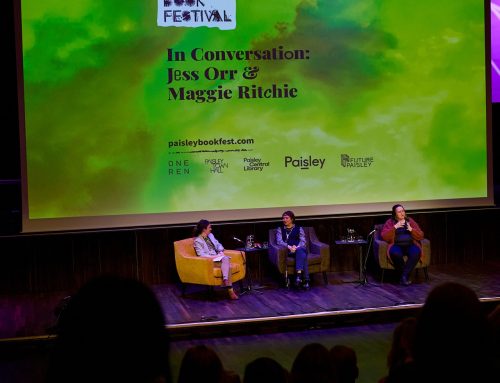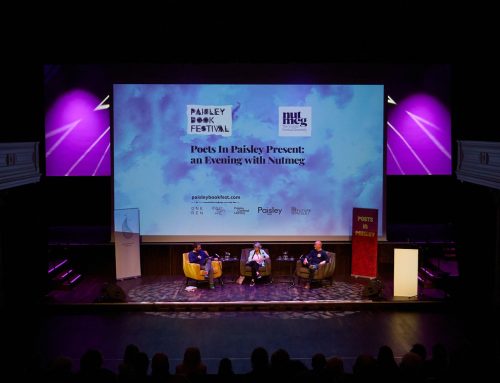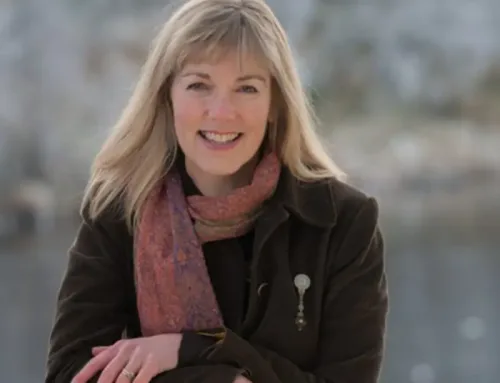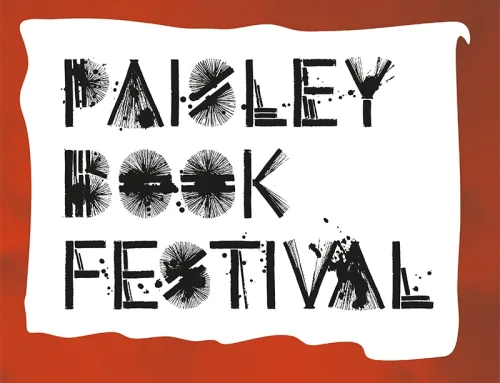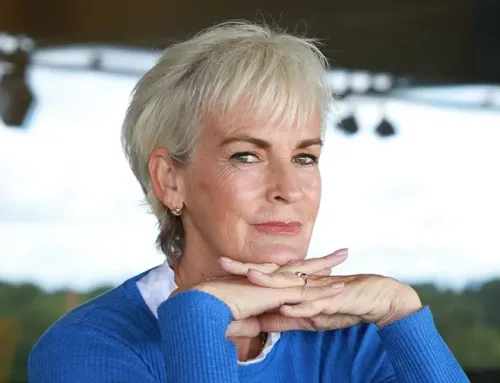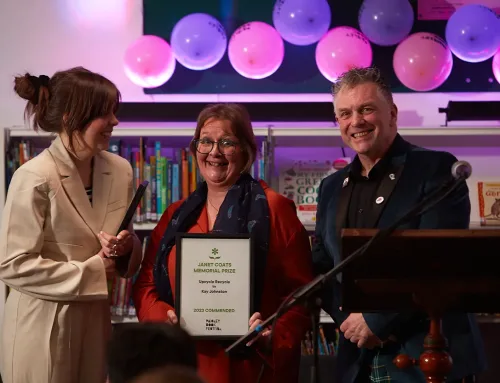As part of the Festival’s thematic thread on The Beautiful Game, this event was a collaboration of voices celebrating a long, colourful and varied history of women’s football. Poet Julie McNeill, was joined by two academics; Fiona Skillen, a historian from Glasgow Caledonian University, who specialises in the history of women’s sport and Karen Fraser, from the University of Stirling, whose doctoral thesis examined Women’s Football from 1960 until the present.
This energetic and lively event involved academic and historical discussion interspersed with poetry from the anthology the three guests had compiled. Read by Julie, the poetry served as a reminder that cold hard facts were important for a variety of reasons, but we should never lose sight of the passion and anguish that draws so many fans to the game in the first place.
Fiona begins by asking the audience to guess the first date historical records mention women playing football. Some people are close but no one correctly pinpoints 1628. This date is known to us as it shows up in church records where concerns are expressed that women are playing football on a Sunday when they should be in church. Not only do we have the first signs of women playing football, we have the earliest evidence of a long history of male repression and restrictions on women’s entitlement to play what we now call the Beautiful Game.
This is where the penny drops. In one of the previous day’s events - An Evening with Nutmeg, Rose Reilly (who was in the audience for Bards, Bans and Ballers: Tall Tales of Women’s Football in Scotland), was talking at length about having to cut her hair and become Ross Reilly in order to play football in the 1960s. She had to leave Scotland and go to France and then Italy in order to realise her dream of playing the Beautiful Game. What this event and An Evening with Nutmeg illuminate is that the history of women’s football in Scotland, from its earliest iterations in the 17th Century, is a history of the repression of women from access to being players of football. It is a history of struggle, resistance, determination, tenacity and never giving in. But it is also a history of oppression, not only in relation to those who wanted to play football, but also of those who didn’t want to play football because they were told, by men and the women who propped up the patriarchal system, that women don’t play football.
There is no concise history of this exclusion or of resistance to it; all that remains are fragments that historians have painstakingly pieced together. The first record of an ‘official’ women’s match is from 1881, when Scotland played England at the grounds of Hibernian Football Club. During the entire Victorian period, the public were hostile to women playing football, because it broke societal norms. These societal norms, like the orthodox traditions in any society, are so deeply embedded, they are very difficult to challenge never mind change.
More than once in the discussion, Karen Fraser drew attention to the fact that the feminist movement/s never saw the oppression of women in sport as a battlefront on which to take their fight against patriarchal power structures.
Despite the general ban on women playing sports alongside men, during the First World War there is evidence of women taking part in competitive games with injured soldiers. Fiona noted that evidence existed to suggest that men had to be rendered disabled in order to take part in games or sports with women. For example, goalkeepers could be blindfolded, players had hands tied behind their backs, and some dressed up in drag. Contempt for the women’s game has, it seems, a very long history.
After the end of the World War 1, there is evidence to suggest that lots of women’s teams emerged, playing against each other and forming leagues. On December 1921, the SFA took action to place restrictions on women playing football, banning them from using official stadia and SFA facilities, as well as access to registered referees. This ban lasted until the early 1970s. Another telling fact is that in 1971, Scotland was the only UEFA country out of 32, to vote against the incorporation of women’s football into national associations. When the reasons for this were queried in the Q&A, Karen said we don’t really know why Scotland voted against women playing association football, since we don’t have the facts that informed their decisions. Fiona was less ambiguous and put it down to old fashioned misogyny within the SFA.
As restrictions on women’s activities slowly lifted lift across Europe, things began to change in Scotland too, and the women’s game, slow to take off, eventually reached the levels of participation we see today. These upsurges in participation have led to increased visibility as the women’s game has begun to attract increased revenue from television and advertising income. The women’s game continues to grow and expand, but the situation is, as Rose Reilly points out, far from perfect.
One audience member welcomed the incorporation of Scotland’s first Board Member of the SFA (in 2017). Rose emphasised that this isn’t enough. We need many more women on the Board. Another audience member shouted out that Rose should have a seat. Everyone nods in agreement.
On the one hand, there is great optimism about the future of women’s football. On the other hand, there is still much frustration at the lack of progress, particularly when it comes to the lopsided funding model. This oscillation, between hope and despair, is perhaps itself, the very characterisation of the Beautiful Game. There are huge disparities in men’s football between the richest clubs and the rest. Yet the game thrives everywhere.
Perhaps, ‘equality’, in the ‘economic’ sense, is the ‘wrong hill to die on’ for women’s football and sport in general. What the last two days of discussion have shown is that it’s the hidden forms of oppression and masculine domination that have, for centuries, restricted women’s rights to participate not just in football, but in the wider political, social and cultural sphere. Participation, the right to take part, irrespective of class, gender or race, should be the objective going forward. This will be difficult, because it challenges the patriarchal structures of power that guarantee the status quo. Maybe we need to be more outspoken, in order to force the issue and ensure the lessons from the past are learnt and everyone accepts that leaving men to sort things out, isn’t the best way to proceed.
This enthralling event concludes with some questions. The coda is provided by Julie McNeill’s wonderful poem ‘Pressure’ which is both contextual and prescient. Women have always had to deal with multiple pressures of work, family and domestic affairs. Pressure is, Julie points out, something women know something about.
Perhaps Rose Reilly is right, maybe we do need more women on the board.



